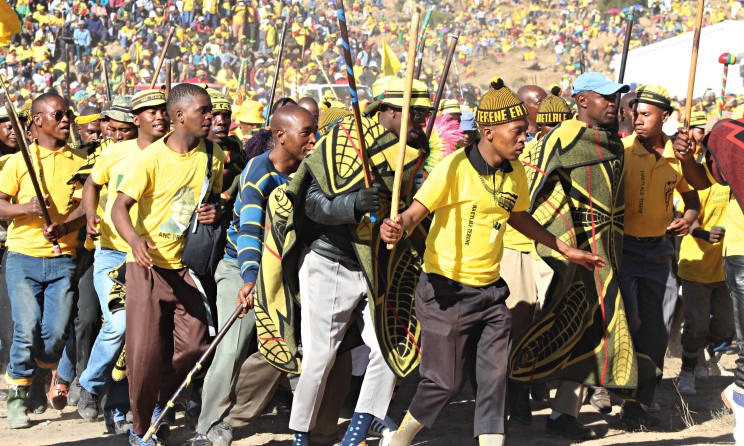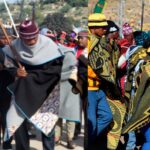A journey of music, conflict, and frustrated hope
Kananelo Boloetse
In last week’s issue, I discussed how politics hijacked Famo Music in 2006, leading to violence within the Famo music community, and culminating in the government declaring certain Famo groups unlawful last month.
This approach, however, is akin to treating the symptoms rather than curing the disease. The underlying issues remain unresolved.
I also mentioned that I attended St John’s High School. This week, I wish to delve deeper into my experiences at that school, hoping that by the end, readers will grasp why this is relevant to the current situation in Famo Music, particularly the banning of Famo groups.
When we were in Form D, there were two Form D classes, D1 and D2, and I was in the latter. As boys in D2, we loved to sing, though I myself was not a gifted singer. Among us were Samuel Leeto from Ha Ramokoatsi, whom we called ‘Large’ due to his big body, and Motlatsi Matšela from Likhoele, whose nickname was Sibolla.
Large and Sibolla were exceptional singers, with Sibolla often leading our impromptu choirs. During break time, lunch, and after school, we sang. We would even sing from school in the evening until we arrived at the major traffic circle in town where we would separate to our respective villages.
Our challengers came when we were in Form E. We were in E2 and, as completers, we thought we were the leaders of the school and used to boss everyone around, expecting them to humbly obey.
One afternoon, while singing at the school’s football ground, a group of Form A students sat nearby and began their own song. They outshone us effortlessly. Embarrassed, we resorted to throwing stones at them, telling them to go sing elsewhere.
These Form A students were masters of their craft. During breaks and lunches, they would retreat to the forest near Tša-Litlama to sing Makhele. From the forest, they would return to their classes in a group, singing.
There was talk in the school that these Form A boys were from lebollong, initiation schools, which perhaps explained their prowess.
They dominated the school with their Makhele, effortlessly claiming the championship from us. Hearing them sing Pheello’s ‘Bolellang Ntate li’a nkotla likoata’ left us in awe. Their rendition was so flawless, it could rival Pheello himself, one of my favourite Famo artists.
This group popularised St John’s High School as ‘Ka Letamong’ due to the school’s proximity to Tša-Litlama. I am not sure if the school was ever called that before, but this group certainly popularised the name or made it fashionable.
After high school, at the National University of Lesotho (NUL), my friend Palo Malie (Dear Man), a die-hard Famo music fan from Mohalinyane in Taung, Mohale’s Hoek, introduced me to an album featuring tracks like ‘Mahabahaba’, ‘Shoalane Ha E Tšoare Lerumo Le Hlabe’, and ‘Ho Thiba Poho’.
“Poho ho hlajoa e hlabang ngoan’a Nthabiseng, e boi li keke tsa e hlaba. Li ka e hlaba joang hoba ntoa ha e loana e ea baleha, e tšola tlhako morong, e khola phalo, e hlasela thota!”
Listening to this album, I recognised Rantšo Maketsi’s voice and was intrigued by another artist who called himself Mahlanya, a very talented singer and a perfect lyricist. I immediately concluded that he was the best Famo artist Mafeteng had in a long time.
This young man, Mahlanya, whose real name is Lehlohonolo Maketsi, was part of that talented group of Form A students who outcompeted us in song at St John’s High School. He had left school to join his uncle Rantšo in Famo music, believing his destiny lay in singing, not academics.
Mahlanya’s future in Famo music shone bright like a diamond. Tragically, his mentor Rantšo was murdered while Mahlanya was still finding his footing.
This loss was a dark omen. A string of murders followed, targeting members of the Seakhi group, as I mentioned last week. Mahlanya alleged that some members of the Lesotho Mounted Police Service (LMPS) were involved in these killings.
His music became a chronicle of grief, mourning the fallen Seakhi members with lyrics like: “Ke hopotse banna ba thata ba Letlama, honeng le re maea ke maboea, ba hana ho khutla, haba khutle ba ileng ba khutle, re tlo ba bona bo ntate Rantšo.”
In 2012, political winds shifted when All Basotho Convention (ABC) leader Tom Thabane became Prime Minister. Hope for justice dimmed as Thabane had ties with Chakela, leader of the Terene group, allegedly responsible for the Seakhi murders.
Despite a brief removal in 2015, Thabane and ABC returned to power in 2017 until 2022. Thabane was ousted in 2020, the same year Chakela died though he had already abandoned ABC.
However, rumours persisted that Terene still held influence called the shots in the ABC-led government.
Readers will recall how in 2022 Sarele Sello, known as Lehlanya, threatened to “deal” with then Prime Minister Dr. Moeketsi Majoro for failing to attend an ABC rally in Mohale’s Hoek alongside party leader Nkaku Kabi.
Lesotho Times reported that Lehlanya was not amused by Majoro’s absence, as he was in Quthing for the burial of slain NUL student Kopano Makutoane.
Lehlanya reportedly said that all ABC members must be present at the party’s rallies at all times. “Where is the Prime Minister? This is his last opportunity, and I swear I will deal with him. I am serious. We are not here to play,” Lehlanya was quoted as saying.
You can imagine the anguish of families who suspect their loved ones were victims of Terene’s violence, only to hear a group leader publicly threaten a whole prime minister. Would they still hold hope for justice?
Following the October 2022 elections, ABC lost power, and the newly established Revolution for Prosperity (RFP) stormed into prominence, securing most seats in the National Assembly. However, lacking a majority, RFP formed a coalition government with its founder and leader Sam Matekane as prime minister.
In less than two years, Matekane’s administration has branded certain Famo groups as unlawful, citing allegations of subversive activities. Police have urged the public to refrain from listening to music associated with these banned groups, including Mahlanya.
Considering all I have discussed, would you stop listening to Mahlanya if you were in my shoes? Would you believe Mahlanya is truly a terrorist, as the government claims, or rather a victim of circumstance?
Over the years, there has been a persistent hope that ABC would be ousted and our governance would evolve to ensure justice for all, particularly for those affected by the violence associated with Famo music.
However, recent governmental actions have cast a shadow over this hope.
Personally, I share the aspiration that Mahlanya, his family, and all families affected by the tragedies linked to Famo music find solace and justice. I harbour no doubt that Mahlanya is a talented singer whose passion lies solely in his music.
Yet, with the government’s sweeping categorisation of individuals associated with Famo music as terrorists, one cannot dismiss the possibility that those who have long-awaited justice might feel compelled to seek alternative avenues.
I know a lot of them. However, this is not an endorsement of such actions but a recognition of the human inclination toward seeking retribution when legal pathways are obstructed.
Where, then, does the prospect of justice lie for those who have refrained from retaliatory acts, only to find themselves branded terrorists by the Prime Minister? When citizens are instructed to cease supporting their music—a lifeline and legitimate livelihood—where does one turn?
The government’s duty is to foster an environment where grievances are addressed through fair judicial processes, not through arbitrary declarations that stifle cultural expression and economic opportunities.
History demonstrates that when governments suppress cultural expression without addressing underlying grievances, they risk perpetuating cycles of conflict rather than fostering lasting peace and reconciliation.
Summary
- This week, I wish to delve deeper into my experiences at that school, hoping that by the end, readers will grasp why this is relevant to the current situation in Famo Music, particularly the banning of Famo groups.
- After high school, at the National University of Lesotho (NUL), my friend Palo Malie (Dear Man), a die-hard Famo music fan from Mohalinyane in Taung, Mohale’s Hoek, introduced me to an album featuring tracks like ‘Mahabahaba’, ‘Shoalane Ha E Tšoare Lerumo Le Hlabe’, and ‘Ho Thiba Poho’.
- Li ka e hlaba joang hoba ntoa ha e loana e ea baleha, e tšola tlhako morong, e khola phalo, e hlasela thota.

Your Trusted Source for News and Insights in Lesotho!
At Newsday Media, we are passionate about delivering accurate, timely, and engaging news and multimedia content to our diverse audience. Founded with the vision of revolutionizing the media landscape in Lesotho, we have grown into a leading hybrid media company that blends traditional journalism with innovative digital platforms.









